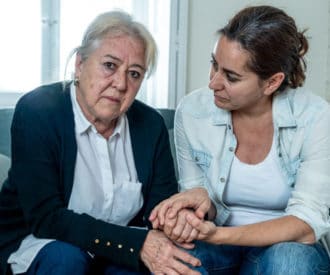One of the most misunderstood and emotionally distressing stroke side effects is pseudobulbar affect (PBA). This is a condition that causes sudden, uncontrollable episodes of crying or laughing, often at inappropriate times. These emotional outbursts aren't a sign of depression or a mental health issue, but rather a neurological response to stroke-related brain damage.
For both survivors and caregivers, PBA can feel isolating and confusing, straining relationships and daily life.
In this article, we explain why these emotional changes occur, how to distinguish PBA from mood disorders, and practical strategies for managing symptoms. Understanding this condition is the first step toward regaining emotional control and connection.

A Stroke Can Cause Cognitive Problems
When someone is recovering from a stroke, most people think of physical problems like muscle weakness, but cognitive issues can be just as challenging to manage and overcome.
One common post-stroke symptom is a neurological condition called pseudobulbar affect, or PBA for short.
It causes uncontrollable laughing and crying, even in situations when it’s completely inappropriate.
And even though 53% of stroke survivors have reported PBA symptoms, less than 20% have heard of this disorder.
We explain what PBA is and why it causes these unintended emotional outbursts.
We also share three ways to support stroke survivors with PBA and five tips to help them cope with the symptoms.
Pseudobulbar affect causes uncontrollable laughing and crying
Pseudobulbar affect (PBA) is a neurological condition that causes uncontrollable crying or laughing.
These responses are exaggerated or inappropriate and usually don’t represent the person’s actual feelings.
Someone with PBA might laugh when hearing sad news, switch quickly from laughing to crying, or cry hysterically over something mildly sad.
They could also experience spontaneous emotional outbursts without any specific trigger.
These uncontrollable outbursts can be embarrassing, cause problems with social life and relationships, and make your older adult reluctant to leave the house.
Even though 53% of stroke survivors have reported PBA symptoms, less than 20% have heard of this disorder.
This makes life even more difficult because it’s extra frustrating when you don’t know what’s wrong or why this strange behavior is happening.

Why does PBA Cause Uncontrollable Emotional Outbursts?
PBA happens when a stroke damages areas in the brain that control how emotion is expressed.
The damage causes short circuits in brain signals, which trigger these involuntary episodes of laughing or crying.
Stroke is one cause of PBA, but it can also be caused by other neurological disorders like amyotrophic lateral sclerosis (ALS), Parkinson’s disease, traumatic brain injury, multiple sclerosis, dementia, Wilson’s disease, or brain tumors.
PBA is Different From Depression
Because PBA can cause uncontrollable crying after a stroke, it’s often mistaken for depression.
That causes it to be underdiagnosed, undertreated, and sometimes inappropriately treated.
In general, depression is an ongoing feeling of sadness or hopelessness that can last for weeks or months.
PBA episodes are brief, spontaneous outbursts that might not reflect how your older adult feels.
PBA treatment and eight coping tips
It’s essential to get a diagnosis to find out if your older adult truly does have PBA.
If that is the cause of the emotional episodes, the doctor may recommend a PBA drug or an anti-depressant.
These drugs are supposed to help control the symptoms, but may not completely get rid of the outbursts.
3 tips for supporting your older adult with PBA
- Keep a log of emotional outbursts. By recording each episode, you can help your doctor make an accurate diagnosis.
- Remind your older adult that their outbursts are a side effect of stroke, not a mental condition.
- Let them know you support them, they’re not alone in this, and that many people suffer from PBA symptoms.
5 tips to help stroke survivors cope with PBA symptoms
- Be open about the problem so family and friends aren’t surprised or confused when you have an episode.
- When you feel an outburst starting, distract yourself by counting objects on a shelf or thinking about something unrelated.
- Take slow, deep breaths until you feel more in control.
- Relax your forehead, shoulders, and other muscles that tense up during an episode.
- When you think you are about to cry or laugh, change your body position.
If You Notice Symptoms, Speak With a Doctor
If you’ve been struggling to understand why your older adult has been experiencing uncontrollable crying and laughing after their stroke, PBA could be the reason.
Check with their doctor or neurologist to get a diagnosis, treatment recommendations, and more information about how to manage the symptoms.
Next Steps: Worried that your older adult has PBA? Take this quick assessment and discuss the results with their doctor
Recommended for you:
- 12 Home Modifications for Stroke Survivors Give Greater Independence
- 11 Adaptive Utensils and Eating Aids for Hand Tremors, Dementia, Parkinson’s, Stroke
- Dressing After Stroke: Tips to Regain Independence
About the Author

Connie Chow
Connie was a hands-on caregiver for her grandmother for 20 years. (Grandma made it to 101 years old!) She knows how challenging, overwhelming, and all-consuming caring for an older adult can be. She also knows how important support is — especially in the form of practical solutions, valuable resources, and self-care tips.





I am my husbands care giver. I came up with early stage Parkinsons. I have trouble hanging in there. Usually we do pretty good. It is stressful. Going to the grocery store can be my treat. Just have to compensate.
House is paid for so I can afford some help as needed. I just count to ten and put one foot in front of the other. I spent 3 months in a nursing home, learning how to walk again after TIA. He did better than I thought he would. We were happy to both be home again.
Thank you for sharing your story with us. We’re so glad that you’re both able to be home together 💗